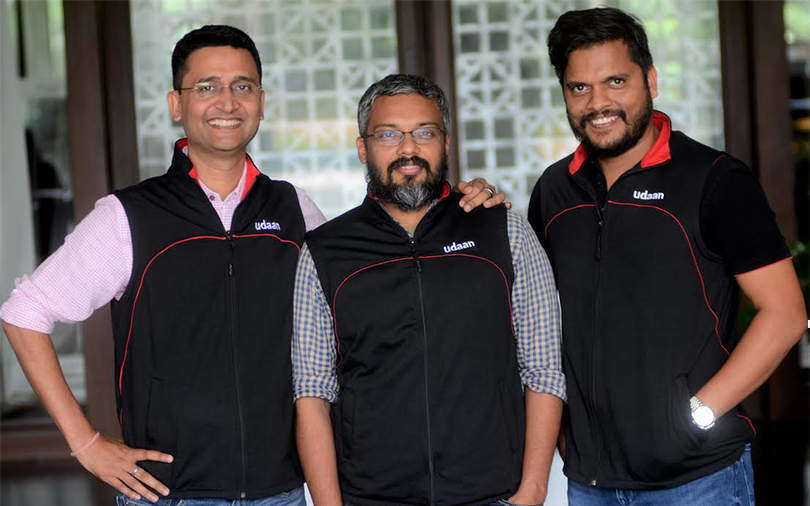
Soaring valuations and Udaan’s bid to crack the B2B ecommerce code


B2B ecommerce marketplace Udaan created a record last year when it crossed the $1 billion valuation mark, making it the quickest entrant into the so-called unicorn club. Early this month, Hiveloop Technology, the Bengaluru based startup that owns Udaan, saw its valuation soar again, to a reported $2.8-3 billion, when it raised capital from a new set of investors.
The most recent funding round saw Chinese technology conglomerate Tencent Holdings and Boston based hedge fund Altimeter Capital join a consortium of investors to pump $585 million into the three-year old startup. In all, Udaan has now raised $870 million over four disclosed funding rounds.
Founded by former Flipkart executives Amod Malviya, Sujeet Kumar and Vaibhav Gupta in 2016, Udaan claims to connect 30 lakh retailers in 900 cities across the country to 20,000 sellers. On the seller side, the platform works with small manufacturers, farmers and brands directly to sell their products to kirana stores, restaurants, street vendors, chemists, offices, small factories and contractors.

The startup, according to multiple media reports, is close to registering a GMV (gross merchandise value of $2 billion. GMV captures the cost of goods sold through ecommerce platforms. Hiveloop Technology reported $8.3 million in EBITDA losses for the financial year 2017-18, a 10-fold increase from the previous year at $820,000, according to data available with VCCEdge.
Udaan declined to participate in this story. Queries to Lightspeed Venture Partners, one of the startup’s earliest investors, did not elicit responses at the time of publishing this report.
The upsides of B2B ecommerce

Unlike B2C (business to consumer) ecommerce, B2B ecommerce offers a better value proposition. To begin with, the customer lifecycle is longer because once a store starts placing orders on a single platform, they remain locked in for some time. There are no deep discounts to attract customers as businesses need to replenish their SKUs (stock keeping units) on a regular basis and there is a steady margin coming in from sellers on the platform as well as from buyers who pay for delivery and line of credit.
Udaan’s parent Hiveloop has five different subsidiaries including Hiveloop Technology. These encompass a range of business verticals including logistics, credit lending arm Hiveloop Capital, which received a NBFC (non-banking finance company)licence in June, as well as other verticals called Hiveloop Apps and Hiveloop Internet.
“The revenue streams of commission, listing and advertising from sellers and recovering logistics costs from buyers kick in when ecommerce platforms achieve scale. At this stage, external funding is crucial for a company to grow its network and logistics capabilities,” said Satish Meena, senior forecast analyst at Forrester research.

While Udaan has invested heavily in growing its logistics network and offering credit on its books to kiranas and other businesses on the platforms, the costs of onboarding these businesses was nominal. “It has now started charging for credit and logistics. Though they are a marketplace, they also have to hold on to inventory especially in the non-branded apparel and other businesses at different centres for speedy delivery,” said an executive who works closely with a competing business on the condition of anonymity.
The GMV has been on the rise especially on account of sales of mobiles and electronics. However these are low margin businesses. Udaan also works with unbranded apparel, footwear and accessory manufacturers and sports goods, stationery and other businesses -- where the margins paid to the platform by the sellers are sizeable, going up to 20%.
According to a person familiar with the company’s operations, Udaan clocks an average order value (AOV) of around Rs 6,000. The company works mostly with Class A and B kirana stores for now which are local supermarkets or semi-supermarkets and have existing deals with distributors for FMCG products.

In order to register profits, Udaan will have to get such stores to order more of what it sells, manufactured by small manufacturers who offer Udaan a sizeable margin, or get large FMCG brands to sell directly on its platform. The other way is to increase reach efficiently to Class C and D kirana stores, where the AOVs are smaller but orders are more frequently due to limited storage space.
Also read: Should B2B marketplaces look beyond SMEs to stay in business?
Competition and opportunity

The competition in India’s B2B market, which is expected to touch $700 billion by 2020, is only going to get more intense. With Reliance Industries looking to launch its new commerce model of powering the supply chain for kirana stores and aggressive plans lined up by Amazon Business and Walmart, Udaan is up against some very deep-pocketed competitors.
Other players in the mix include Kalaari Capital and Nexus Venture Partners backed Jumbotail, which is looking to go deep into supplying staples and PoS (point-of-sale) to kiranas, and fresh produce focused B2B platform Ninjacart which was valued at $331 million during its last funding round in April.
According to a report by research and marketing firm Redseer, the online B2B segment has been successful in acquiring only 1 lakh retailers out of 1.5 crore Indian retailers. That implies a large headroom for multiple companies to grow.

For a startup that rolled out its full scale model in July 2017, Udaan’s continued growth depends on multiple factors -- from getting each of its business verticals to work in tandem to cracking the code for FMCG, staples and fresh produce categories.
